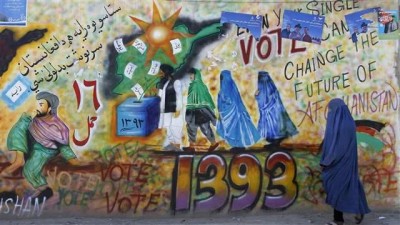Afghan Elections: Pick Your Poison

No human being wants to be ruled by their people’s murderers. Forgiveness through restorative justice may be possible, but being ruled by murderers is asking for too much.
Yet, that seems to be the Hobson’s choice behind the Afghan presidential election, which is into its run-off between Dr. Abdullah / Mohaqiq’s team and Dr. Ashraf Ghani / General Dostum’s team, neither team having won more than 50% of balloted votes in the first round.
Both teams have members who are warlords accused of human rights abuses, as reported by theNew York Times, including Dr. Abdullah Abdullah’s running mate, Mohammed Mohaqiq, and General Dostum, who is Dr. Ashraf Ghani’s vice-presidential candidate.
General Dostum, allegedly on the CIA’s payroll in the past, apologized for his past war crimes when he registered as Dr. Ashraf Ghani’s vice-presidential candidate. One of those crimes is the Dasht-e-Leili massacre which occurred in the fall of 2001. New York Times and Newsweek investigations alleged that hundreds or even thousands of surrendering pro-Taliban prisoners died of thirst, hunger and gunshots when they were stuffed into shipping containers for transport to an Afghan prison.
Both presidential hopefuls in the run-off elections on June 14th have already vowed to sign the Bilateral Security Agreement, which President Obama mentioned in his surprise visit to Bagram Air Base in Kabul, not even bothering to visit President Karzai who declined to visit him at Bagram.
Article 7 of the Bilateral Security Agreement, states that, “Afghanistan hereby authorizes United States forces to control entry to agreed facilities and areas that have been provided for United States forces’ exclusive use…” and also that “Afghanistan shall provide all agreed facilities and areas without charge to United States forces.”
Article 13 includes this: “Afghanistan … agrees that the United States shall have the exclusive right to exercise jurisdiction over such persons in respect of any criminal or civil offenses committed in the territory of Afghanistan.”
It is understandable that President Karzai isn’t willing to sign the agreement. It may leave a disastrous legacy.
I asked an activist who has been working in Afghanistan for ten years what he thought about the run-off in Afghanistan’s elections. “Many Afghans, and people all over the world, are getting more and more cynical about elections,” he told me. “And they should be, because how did our psyche become conditioned to accept that by electing corrupt, selfish, proud, wealthy and violent elites every four or five years, our ordinary lives will be changed? Our planet is exasperatingly unequal and militarized. To place in power the ones who continue this status quo is bizarre.”
Bizarre, yet disturbingly familiar.

